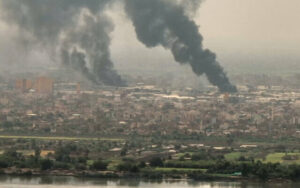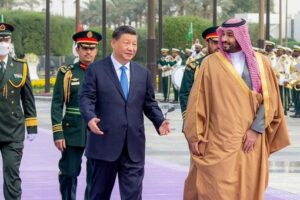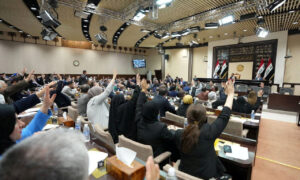
The National Interest Foundation Newsletter
Issue 195, June 16, 2023
Welcome to our NIF Newsletter. In this week’s headlines: we analyze the deteriorating situation in Sudan and the ejection of the UN special envoy, examine how the growing relationship between China and Saudi Arabia will affect Middle Eastern politics, and assess the potential effects of the recently passed budget in Iraq.
Written by Jacob Van Veldhuizen and Toni JeBailey
UN Envoy Ejected as Situation in Sudan Deteriorates

There is a risk that Sudan will become a failed state. (Photo from AFP)
Sudan’s Removal of the UN Envoy Has Made Peace More Difficult
The situation in Sudan continues to degrade as pathways to peace become scarcer. Recently, the UN-appointed envoy and key mediator Volko Perthes was declared persona non grata by the Sudanese government. This means that Sudan will no longer welcome Perthes into the country to allow him to fulfill his role as a mediator between the two warring sides. The request to remove Perthes from his role was made in a letter from Gen. Abdel Fattah Burhan, the leader of the Sudanese Armed Forces (SAF) and de facto leader of Sudan, to U.N. Secretary-General Antonio Guterres. According to the UN charter, member states cannot be made persona non grata. Burhan request for removal comes just 2 weeks after he had previously criticized Perthes for allegedly stoking the conflict. The exclusion of the UN from the mediation efforts will harm chances for any comprehensive peace deal. Saudi and American personnel are still active in mediation efforts, but each side has personal stakes in this conflict, eliminating their ability to be impartial.
The civil war in Sudan began primarily due to a disagreement about the integration of the Rapid Support Forces (RSF) into the regular Sudanese military. The leaders of the two factions are Gen. Abdel Fattah Burhan, the head of the army, and Commander Mohamed Hamdan “Hemedti” Dagalo, the head of the RSF. The RSF is a paramilitary group that has roots in the infamous Janjaweed, another paramilitary group that was responsible for numerous human rights abuses during the conflict in Darfur from 2003 to 2020. The Janjaweed was utilized by Omar al-Bashir, the despot of Sudan at the time, to combat a separatist movement in Darfur while his army was combating a different separatist movement in the South. In 2016, Bashir folded portions of the Janjaweed into the government command under his direct control. He put Hemedti in charge. In 2019, Bashir was overthrown and a transitional government took over. Both Burhan and Hemedti were involved in this government. In 2021, Burhan and Hemedti overthrew the transitional government. This eventually led to the disagreement and subsequent conflict. There are also other contributing factors, such as the economic stakes that each leader has in the country.
Though this is a different situation, the similarities with the events that led up to Somalia being declared a failed state is cause for alarm. In 1991, clan warlords overthrew a dictator and then turned on one another leading to famine and a three-decade-long civil war. After the government collapsed, the country descended into chaos. According to reports on the ground, many parts of Khartoum are beginning to resemble Mogadishu. The recent ejection of the UN-appointed envoy also mirrors the 2019 decision by Somalia to do the same. A large population of each country also struggles with food insecurity, with more than a third of the country needing food aid before the war. This will only continue to worsen as the conflict continues. Aid agencies have had difficulties delivering much-needed supplies as many conveys have been attacked and warehouses looted. This is another similarity between what happened when Somalia collapsed and what is happening now in Sudan. These indicators paint a dark future for Sudan. There is also renewed violence in the Darfur region, where elements of the Janjaweed are once again indiscriminately killing civilians. Many people have fled the areas of conflict into refugee camps away from conflict zones both in the country and in neighboring countries. These camps are often makeshift. The upcoming rainy season, which last year caused floods that killed hundreds, poses a threat to those sheltering in the camps, as they will have even less protection from the elements and natural disasters.
The various foreign actors involved in Sudan also complicate any prospects for peace. Sudan is rich in many natural resources including gold and oil. These natural resources make it a tempting target for outside powers and nonstate actors to exploit the instability for their own gain. Many non-Western, midsize powers are jockeying for influence as they continue to try and fill the power vacuum America left in the wake of its shift from the Middle East. The lack of leadership (as flawed as the US’s was) allows more room for other nations to unilateral operate for their own gain. All of these different influences will further destabilize Sudan as regional powers work to secure their interests and stop rivals from advancing their own. Some powers choose to hedge their bets. Both Hemedti and Burhan have relationships with Saudi Arabia and the UAE. Burhan received support from the Saudis and Emirates after the coup. Elements of Hemedti’s RSF have fought for the Gulf powers in Yemen, which earned Hemedti significant wealth and power. Hemedti also has ties with powerful actors in Chad and the Central African Republic. Some Chadian rebel groups have shown interest in allying with Hemedti. He has so far abstained as this would harm his relationship with the Chadian leader General Mahamat Idriss Deby Itno. Hemedti also has links to the Wagner paramilitary group and Libyan war criminal Khalifa Haftar, who is supplying the RSF with weapons. Burhan and the SAF have a significantly shorter but more powerful list of allies which includes the backing of neighboring Egypt. All of these conflicting foreign interests involved in the region will lead to a longer and more deadly war.
One of the most important differences between the conflict in Sudan and the conflict in Somalia is that Sudan still has an active civil society with the potential to bring about change. The resistance committees, which were instrumental in the overthrow of Bashir, are still active and have influence. Other elements of Sudanese civil society are also active. Western governments made the mistake of allowing these groups to be pushed aside in the wake of the 2019 revolution. There is still time to correct this mistake and give these civil societies support, though it may be too little too late. No outcome is certain, but diplomatic solutions are the only option for this conflict to come to a quick end. Both sides militaries are evenly matched and neither shows interest in negotiating an end to this conflict. Though the SAF has more sophisticated weaponry, the RSF has greater numbers and better organization. Each side has hunkered down in preparation for the slugfest of attrition that will continue to cause the deaths of civilians and force the survivors from their homes. The conflict will make the restoration of civilian rule significantly more difficult, but not impossible. The United States and its allies must support these civil societies to create a path out of this conflict.
China and Saudi Arabia

China and Saudi Arabia will both benefit from a closer relationship. (Photo from Reuters)
China and Saudi Arabia Continue to Strengthen Relations
The 10th annual Arab- China Business Conference began June 11th in Riyadh, Saudi Arabia as the Saudi and Chinese government continue to grow ties. The kingdom and China have already signed a series of notable business and government deals. The largest thus far, a $5.6 billion agreement between Saudi Arabia’s Ministry of Investment and the Chinese electric car maker Human Horizons, aiming to expand cooperation and collaboration within the automobile industry. This deal contributes to the $10 billion in agreements made on the first day of the conference alone. These bilateral initiatives account for almost all sectors of the economy, particularly non-oil related, in attempts to diversify the Saudi economy. With the total trade volume between the two states amounting to $430 billion by the end of 2023, the conference holds the potential for more large-scale deals in the upcoming week. The event itself, occurring days after the U.S. Secretary of State Antony J. Blinken visited Saudi Arabia with efforts to improve strained U.S.- Saudi relations, signals a more significant shift of Saudi Arabia’s cooperation towards China and away from Western powers.
Endeavors into non-oil sectors serve the primary purpose of Saudi Vision 2030, the kingdom’s plan to diversify its economy to finance infrastructure and development projects successfully. One vital aspect of this is the tourism industry, with China serving as a central partner within this plan. In 2019 China ranked first in the global contribution to the supply of tourists; investments by both states towards this initiative bear various cultural and economic benefits. With Saudi Arabia aiming to bring in $46 billion in tourism revenues, several incentives to Chinese tourists have been implemented, including improving visa processes, air travel, and marketing the kingdom on traditional Chinese media sources and social media platforms. Aspirations of these tourists contributing to the local Saudi Arabian economy desire to be mutually beneficial to Chinese investors and government officials as the travel eventually begins to flow both ways between the two states.
In light of these recent business deals, a larger pattern of China’s investment in the Arab World is observed. As China’s President Xi Jinping remarked on his visit to Saudi Arabia this past December, these current efforts between China and Saudi Arabia reflect a “new era of cooperation” between China and the rest of the Middle East. This increase in China’s investment is also mirrored by China’s similar interests in Iran, the UAE, and Egypt; as of 2021, China had a total of $23 billion invested in various Arab states. These countries, alongside Saudi Arabia, have recently attempted to join the BRICS group, indicating further large-scale desires for Chinese collaboration and cooperation. China also served as a mediator in brokering a deal between Saudi Arabia and Iran earlier this year, reopening the Iranian Embassy after seven years of no diplomatic interaction. The ability to bridge this connection between two previously opposing powers is a testament to China’s regional capabilities. This investment extends beyond financial affairs and into the socio-political happenings within and between Middle Eastern states. Initiatives extend to the increase in Mandarin language programs within Saudi Arabia, as it is now displayed on airport signs at Riyadh’s airport. Previously this week, Chinese Premier Li Qiang met with Palestinian President Mahmoud Abbas to expand diplomatic relations and announce the formation of a “strategic partnership,” extending far beyond China’s financial contribution to Palestinian efforts. China is cementing its stronghold within all aspects of the Arab world. This, coupled with the continued diminishing presence of the United States, leaves an opportunity to fill the vacancy.
Yet, whether or not China will rise to the same level of power as the United States within the Middle East remains in question. Currently occupying the role of a neutral trading partner, the future potential for China to start intervening in domestic state issues is up for contention. This current position remains beneficial for China, as it allows for the continued expediting of business deals without fear of meddling in political affairs, as demonstrated in Riyadh this past week. Instead, a continued road of collaboration between China and Arab states remains the current favorable course of action to advance mutually beneficial agreements and relations. As Saudi Arabia continues embarking on oil output cuts and large-scale project investments, the power dynamic and development between the kingdom and China will determine the next generation of political dealings within the Middle East.
Iraqi Budget

Iraqi lawmakers recently approved a budget aiming to revive the country’s economy. (Photo from Reuters)
What the Iraq Budget Approval Means for Kurdistan Region
Iraq’s Parliament passed the 2023 budget Monday, June 11th, allocating 198.9 trillion dinars (or $153 billion USD), with the central goal of increasing jobs and improving infrastructure disregarded during war and conflict. The budget is the largest in the state’s history, as funds will be preserved and replicated by that amount through 2025. This milestone coincides with the rapidly growing population within Iraq, one of the fastest projected increases in the world, as it aims to create more public sector jobs that will hopefully benefit the state-led economy and public demands while accommodating a mass influx of work-capable adults within the next few years. Simultaneously, the goal of improving damaged infrastructure and reconstruction projects intends to help reform recovering areas from years of neglect due to strife. With an estimated deficit of 64.36 trillion Iraq dinars, the budget was calculated based on the $70 USD per oil barrel selling price and a greater exchange rate of 1,300 dinars per U.S. dollar. As rising oil prices are deemed necessary to subsidize spending, the budget aims to address another concern within Iraq, its relations with the Kurdistan Region and its oil supply.
After negotiations held in April in response to Turkey’s freezing of crude oil exports and subsequent market effects, Kurdish officials signed an agreement that allowed oil revenue management by the Iraqi central bank. Previously, Kurdish oil companies had exported oil through Turkey, with the latter state’s decision to cease exports being due to a ruling from the International Chamber of Commerce (ICC) deeming the facilitation of the sale of Kurdish oil illegal and ordering damages paid due to the Iraqi government. The Iraqi state-led company SOMO now controls all exportation of Kurdish oil, with Kurdish entities still retaining marketing control. Contentions over this issue were exemplified during the budget approval process as the most prominent Kurdish party, the Kurdistan Democratic Party, raised various issues and objections throughout the voting period. Since the budget’s approval, oil production and exportation have not resumed, resulting in a $2 billion loss in revenue thus far. With the recent election of Turkey’s President Tayyip Erdogan, aspirations of the state resuming oil exportation remain but are contingent on the conclusion of the arbitration case with the ICC.
With the budget’s success dependent on maintaining oil prices and preventing a decrease, the International Monetary Fund issued warnings regarding the long-term effects on Iraq’s economy. In a statement released last month, caution of “intensifying financing pressures” amidst pre-existing poor economic conditions was given concerning the extent of spending the budget allotted for. While the budget also intends to address the public pleas for job creation with intentions of addressing economic issues and conditions, the long-term success of this strategy may not have time to fully manifest compared to the rate of spending the budget permits (and subsequent debts). This, compiled with the pre-existing deficit and rapidly growing population rates, questions whether these job opportunities will sustain the number of young adults entering the workforce and if any financial success and personal prosperity can be possible within the plan. With the revenue from oil playing a critical role, it will be imperative to see if the new Iraqi control of Kurdish oil exportation and finances will help the plan succeed overall. Turkish and Iraqi officials are scheduled to meet on June 19th to discuss the resumption of oil exportation, as developments within these upcoming months will significantly determine the budget’s capabilities within the next few years.
This budget is extremely risky. Many things can go wrong, from the fluctuating prices of oil to the disagreements between Kurdish oil companies and the Iraqi government. There is a very good chance that this instability could lead to an economic collapse in Iraq, which will compound the problems that caused the collapse, creating a vicious cycle. Though this budget can be successful, its dependence on many factors outside of the government’s control is cause for concern. Iraq will need to work closely with other oil-producing neighbors to ensure the budget does not bring about economic ruin.
Enter the text or HTML code here
